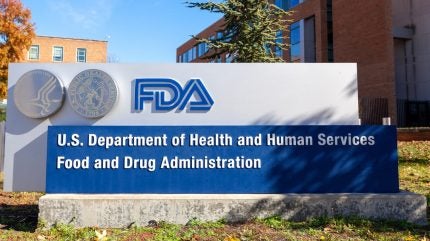
The Food and Drug Administration (FDA) is to overhaul the US regulator’s structure and food-safety procedures in the wake of criticism over its handling of last year’s infant-nutrition crisis.
“Clear priorities that are focused on protecting and promoting a safe, nutritious US food supply that more quickly adapts to an ever-changing and evolving environment” will be visited, the FDA said.

Discover B2B Marketing That Performs
Combine business intelligence and editorial excellence to reach engaged professionals across 36 leading media platforms.
Amongst other changes, the agency will appoint a deputy commissioner with responsibility for human foods.
Its announcement comes just days after it was revealed Frank Yiannas, a senior official at the FDA, had stepped down amid news Abbott Laboratories, the company at the heart of the infant-formula crisis, is to face a criminal investigation by the Department of Justice.
An outbreak of salmonella at Abbott’s Michigan plant early last year led to the facility’s temporary closure and nationwide product shortages.
Consumer complaints were linked to cronobacter sakazakii or salmonella illness in children to the consumption of formula made at the plant.

US Tariffs are shifting - will you react or anticipate?
Don’t let policy changes catch you off guard. Stay proactive with real-time data and expert analysis.
By GlobalDataThe plant’s closure and a large-scale product recall led to severe shortages on supermarket shelves. The issue became so serious that US President Joe Biden took executive action to try to help solve the problem. Product was shipped in from overseas providers to compensate for a lack of domestic supply.
The FDA was widely criticised for its response to the crisis and, in December, a wide-ranging report into the practices, culture and structure of the organisation called for change. It said the FDA had a confusing leadership structure.
Announcing its response yesterday (31 January), FDA commissioner Robert Califf said: “The agency has carefully reviewed the findings and recommendations from an external evaluation conducted by an expert panel of the Reagan-Udall Foundation that I requested and a separate internal review of the agency’s infant-formula supply chain response completed last year. The findings and recommendations from these reviews identified issues surrounding culture, structure, resources, and authorities. They also noted several areas of need, including modernising data systems, providing more resources and authorities, improving emergency response systems, and building a more robust regulatory program.”
Describing its overhaul as “transformative”, Califf said the FDA will establish a Human Foods Program led by a deputy commissioner and unite its Center for Food Safety and Applied Nutrition, Office of Food Policy and Response (OFPR) and certain functions of its Office of Regulatory Affairs (ORA).
The ORA will also undergo structural changes to support the Human Foods Program through inspections, lab testing and investigative operations.
The FDA is also launching an Office of Integrated Food Safety System Partnerships to “improve collaboration with state and regulatory organisations” and a Human Foods Advisory Committee – a team of external experts who will share their views on emerging issues in nutrition, food safety and food technologies.
Califf said: “This newly proposed structure will ensure greater collaboration and support of state-level inspectional activities. We know that we cannot be everywhere at all times and our relationships with our state and local regulatory partners will be more important than ever going forward.”
The response to the proposed changes has been mixed.
Welcoming the announcement, Dr. Peter Lurie, president of consumer advocacy body the Center for Science in the Public Interest (CSPI), said the FDA has made a direct attempt to address the well-publicised challenges that [the food] programme has faced.
“By elevating the program to be led by a deputy commissioner, streamlining reporting structures, creating a Center for Excellence in Nutrition and clarifying the relationship between the Office of Regulatory Affairs and the food program, the agency has confronted each of these issues head on in a manner that is likely to improve efficiency and benefit the American people,” he said.
But food industry trade body the Consumer Brands Association said that, while the announced changes represent a “positive first step”, they do not go far enough.
It said: “We commend the commissioner for moving the needle on unified calls to appoint a deputy commissioner for foods to elevate the program’s function and importance and initiate critical culture change and modernisation. While today’s announcement is a positive first step, it fails to provide the deputy commissioner with direct line authority over all major foods program components or fully integrate the agency’s policymakers with its inspection force.
“We are concerned that anything short of this and a fully empowered deputy commissioner will make it difficult to truly unify the program and deploy the prevention mindset envisioned under the Food Safety Modernization Act.”





